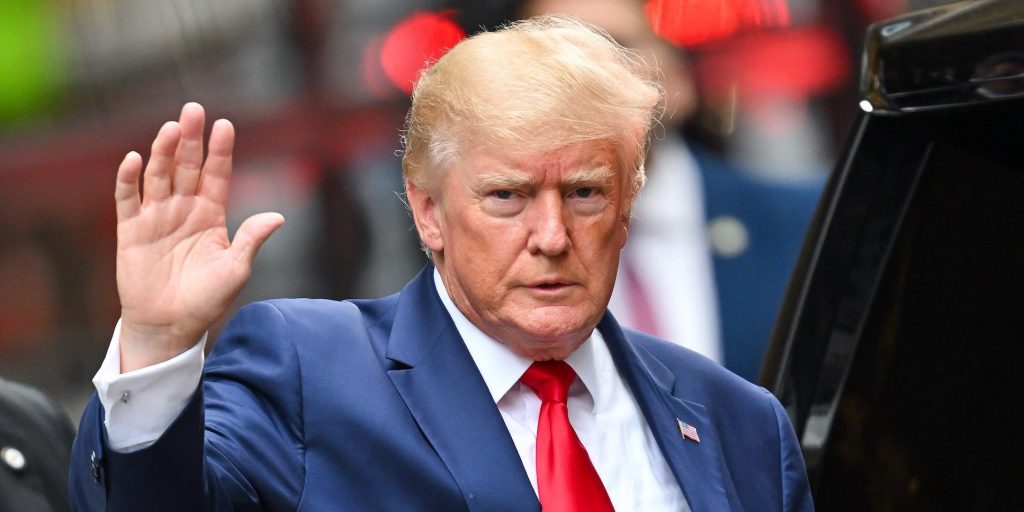- A recently released FBI affidavit related to the Mar-a-Lago search spells trouble for Trump.
- "Donald Trump will be indicted in the classified documents matter," a national security lawyer said.
- The affidavit also throws a wrench into Trump's claim of innocence because "it was all declassified."
A federal magistrate judge on Friday unsealed a redacted version of an FBI affidavit that legal experts said is a damning blow to former President Donald Trump as he's criminally investigated over his handling of official government records.
Significant portions of the document were blacked out to conceal information that might reveal:
- The identities of people (witnesses, law enforcement agents, and uncharged parties) involved in the DOJ's investigation into Trump's handling of national security records
- Sources and methods
- Grand jury information
- The overall size, scope, and direction of the department's inquiry
Still, the affidavit contained telling clues about why investigators took the extraordinary step of executing a search warrant at Trump's Mar-a-Lago estate earlier this month, and the extent to which officials tried using less intrusive measures to get Trump to hand over government records that were improperly stored at his Florida residence.
"There certainly existed probable cause to believe that the former president retained classified documents in violation of the applicable statute in a place that was not secure according to the regulations," David Weinstein, a former federal prosecutor from the Southern District of Florida, told Insider.
"This hurts him more than this helps him," he added.
Norm Eisen, the ethics czar under former President Barack Obama, wrote after going through the affidavit that "even redacted it is absolutely damning."
"People are likely going to jail for this conduct," he said.
Some national security veterans went a step further, directly calling out the 45th president and suggesting there may be a first-ever criminal case against a former chief executive.
"I have seen enough, folks," Bradley Moss, a prominent Washington, DC, national security lawyer, wrote on Twitter. "Donald Trump will be indicted in the classified documents matter. I'm placing my marker."
Here are some key details from the affidavit:
- A National Archives review of 15 boxes of government records that Trump turned over in January found that they contained "newspapers, magazines, printed news articles, photos, miscellaneous print-outs, notes, presidential correspondence, personal and post-presidential records, and 'a lot of classified records.'"
- The "most significant concern" for NARA was that "highly classified records were unfoldered, intermixed with other records, and otherwise unproperly [sic] identified."
- There were 184 documents with classification markings in the 15 boxes: 25 were marked top-secret, 92 were marked secret, and 67 were marked confidential.
- "Several of the documents contained what appears to be [Trump's] handwritten notes," the affidavit said.
Perhaps just as noteworthy, the Justice Department revealed in a brief accompanying the affidavit that it is keeping portions of the search records related to the Mar-a-Lago raid under seal to protect a "significant number of civilian witnesses."
The brief also indicated that the government has probable cause to believe "that a statute prohibiting obstruction of justice has been violated," and that there is a heightened risk of violence against FBI agents and other law enforcement personnel in the wake of the Mar-a-Lago search.

A footnote undermines Trump's main defense
Alan Dershowitz, the conservative lawyer who represented Trump in his Senate impeachment trial, told Insider that "there's no doubt" the FBI had probable cause to search Mar-a-Lago.
He added "there may be enough there for an indictment," but he doesn't think Trump will ultimately be charged because in the past, "people who have done similar things have not been indicted."
Dershowitz also predicted that Trump's legal team will try to argue that he had declassified all the documents stored at Mar-a-Lago, but that such a defense "will have to be based in fact."
Indeed, the details contained in the redacted affidavit appear to fly in the face of Trump's claim that he had declassified everything. CNN also spoke to 18 former White House aides and advisors this month, none of whom had heard of any standing declassification order.
Moreover, even if Trump had declassified the materials in his possession, it likely wouldn't matter — and the FBI's affidavit said as much.
Specifically, it pointed out that Section E of the Espionage Act, one of the three laws Trump is suspected of having violated, makes it a crime to retain any government records pertaining to the US's national defense, regardless of classification level:

The other two federal statutes Trump's suspected of having broken — 18 USC Section 2071 and 18 USC Section 1519 — criminalize the concealment, removal, and destruction of government records, also regardless of classification level.
Shanlon Wu, a longtime former federal prosecutor, told Insider that Trump's lawyers are "barking up the wrong tree by focusing only on classification."
He noted that in addition to the fact that the laws Trump is suspected of violating don't depend on classification, the redacted portions of the affidavit could detail why federal officials didn't believe they could trust Trump's lawyers when they said that all classified material had been turned back over to the government.
Overall, the FBI recovered more than two dozen boxes of official government records between January and this month, when they searched Mar-a-Lago.
Magistrate Judge Bruce Reinhart ruled to release the affidavit on Thursday, a decision that was in and of itself significant.
Typically, affidavits aren't released until formal charges are filed in an investigation. But former prosecutors say the unusual circumstances of this case, coupled with intense public interest in the matter, likely weighed in favor of the document's release for Reinhart.
"This is huge," said one former DOJ official, who requested anonymity to candidly discuss the case. "But there's so much distrust in the Justice Department and the FBI, and if you keep a document like this hidden, the conspiracy theories just breed themselves."
"Let it out and show it the light of day," they added. "Of course it has to be redacted, but people need to see that [US officials] tried multiple times to get these highly classified documents, that Trump wouldn't give them up, and they were just sitting in a basement in Florida."
Trump, for his part, had repeatedly and publicly called for the release of the FBI's affidavit.
He put out a statement after it was released on Friday, accusing the FBI and DOJ of a "public relations subterfuge" and recycling claims of political persecution and bias.
